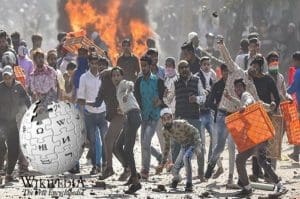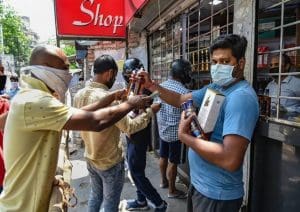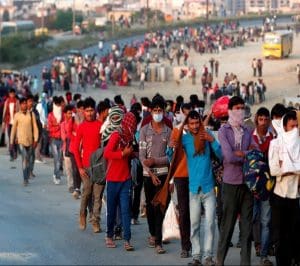All over the world is suffering from a pandemic disease known as Covid-19. It has disturbed the political, social, economic, religious and financial structures of the whole world. Countries such as US, China, UK, Germany, India, France, Italy, Japan known to be a World’s top most economies. The economic condition of these countries are going at the verge of collapse. Because of Covid-19, Stock Markets around the world have been crashing and oil prices have fallen off a cliff. In just one month 3.3 million Americans applied for unemployment and a week later another 6.6 million people started searching for jobs. Many experts on economic and financial matters Such as Managing Director of International Monitory Fund (IMF) Kristalina Georgieva, have warned about the deteriorate condition of global economic and financial structure. Moreover, Covid-19 is harming the global economy.

When it comes to the human cost of the Coronavirus pandemic it is immeasurable therefore all countries need to work together with cooperation and coordination to protect the human life as well as restrict the economic damages. For instance, the lockdown has restricted various businesses such as travelling , Tourism to contain the virus consequently this business is coming to an abrupt halt globally.

If we talk about India, the COVID-19 epidemic has heartlessly highlighted our shortcomings and failures, even as we pride ourselves on being the world’s largest democracy and its fifth largest economy. It has highlighted the transparent condition and working profile of our country results in our old age fault lines of caste, class and creed. Because of COVID-19 we can realize if our government were focussing on core issue like research, medical, education etc. in place of doing dirty politics on caste, religion, corruption promotion in election etc. from the indepence of India in 1947, it would have better condition then now.

Yes, the lockdown was necessary in order to limit the spread of the pandemic but we have seen government have no money, better medical facility and other essential resouces during this lockdown period. The Covid-19 curve in India is not going to be flat unwillingly the government of India have to open the market. It shows that GOI unable to run the country under total lockdown for few month due to lack of revenue. There are still too many inequalities, and too many of us who have been left behind, on whom the effects of the lockdown have been the most severe, compounding the economic distress of recent years.

However GOI also fails in the manner of its implementation, without the forcasting, much less planning for the consequences, coordinating with States in advance, or spelling out how it would support the millions so affected, was harsh in the extreme on the poorer sections of our population. It was undoubtedly reflected in the thousands of migrant workers believing that they were invisible to the Establishment, and not knowing what else to do, leaving by foot, trying to reach the only safety net they had — extended families and homes in their villages.
Many of them are however stuck at borders, including state, district and at national border areas. These are the most marginalized sections of the society who are dependent on daily wages for their living, and in times of such distress need sympathy and understanding of the society. Immediate concerns faced by such migrant workers relate to food, shelter, healthcare, fear of getting infected or spreading the infection, loss of wages, concerns about the family, anxiety and fear. Sometimes, they also face harassment and negative reactions of the local community. All this calls for strong social protection.

There lies grave danger here, of both the health and the economic consequences of the crisis intersecting amongst our poor, with potentially devastating consequences for them as well as for our overall attempt to manage the novel coronavirus.
It is time for the government to lay out a comprehensive road map to deal with both the health and the economic consequences of the crisis, and to make long overdue investments on the massive scale needed, in universal health care, education and social security. Or at least to plan for it, and to raise the resources to back these plans with adequate funding, regardless of the fiscal deficit that will follow.
In its absence, we run the risk of social disorder, as witnessed in Mumbai, Gujarat and other parts of India where our poor people are in lockdown. Growing perceptions of injustice and of the government’s indifference to their hell could well lead to widespread violation that would be difficult to control.
The investment that needs to be made in the millions of our people who live in poverty, or on the edge of it, are not merely welfare measures. They are fundamental to our socioeconomic transformation, which in itself is an imperative. Also, if India is to be in any position to make use of opportunities that emerge in the reordering of the global economy as the pandemic recedes.
We are living in an era of uncertainty, and when there is uncertainty the government has to be very careful and prudent on how it spends its money. The Government cannot and must not exhaust all its fiscal capacity at one go. Keeping the Gunpowder dry at times of crisis is the most responsible thing to do as Nation and the world navigate these perilous and unprecedented times.
There is an urgent need to reprioritize budgeted expenditures in favor of health-related expenditures including health infrastructure. In terms of rebooting the economy, new manufacturing capacity needs to be attracted in India. which would require additional budgetary allocation. In fact, both revenue and expenditure side estimates of the central and state budgets which were only recently presented in the Parliament and respective legislatures would need to be overhauled. As things begin to normalize, there may be a need to present new full year budgets since the existing budgetary numbers have been rendered irrelevant by the onslaught of the global pandemic.
In reviving its economy post-Covid-19, India could turn a crisis into an opportunity by resetting its energy spending to favour clean energy, enabling citizens to continue enjoying the unprecedented clean air and blue skies bestowed by the lockdown.
As a start, Prime Minister Narendra Modi could solarise over 39,000 unelectrified health sub-centres—the first point of contact between the primary health care system and the local community — serving 230 million people in rural India. That is the recommendation of 20 leaders from top think-tanks, renewable energy companies, industry groups, and health care services, who wrote to Prime Minister Modi on April 30, while there is still time to tilt policy.

Another way of shifting from fossil fuels to clean energy, say experts, is for the government to transfer some of the massive subsidies currently given to fossil fuels to renewable energy.
“With this restart, a window of hope and opportunity opens… an opportunity for nations to green their recovery packages and shape the 21st century economy in ways that are clean, green, healthy, safe and more resilient,” United Nations climate body chief Patricia Espinosa said on April 22.
A new report that analysed India’s subsidy support to its energy sector, by think-tanks IISD and CEEW made similar recommendations.
“There is a phenomenal opportunity for India in re-thinking if there is a better way of spending coal and oil and gas subsidies to make them investment-worthy,” said Karthik Ganesan, a research fellow at CEEW .
The country’s energy demands have fallen by up to 30 per cent during the first week of lockdown that began on March 25. Vibhuti Garg, senior energy specialist at IISD and a co-author of the IISD-CEEW report said that as economic activity revives, demand for coal and oil will increase, but the rate of growth will be low and this presents an opportunity, said. Any increase in demand can be met through more offtake of cheaper, renewable energy.

When news broke in media about Peoples Bank of China (PBOC) acquiring over 1% shareholding in the Housing Development Financial Corporation (HDFC),one of India’s largest housing finance company. It caused a sedden storm in the entire financial media and the business community. It is going to be percept that Indian companies will become easy targets for acquisition by Chinese investing company in the COVID-19 pandemic situation.
After that indian government comes into the action, The Department for Promotion of Industry and Internal Trade, Ministry of Commerce & Industry, Government of India (DIPP), the Government agency responsible for FDI policy which regulates foreign investments into India, has amended the FDI policy, with a cocern to protect Indian companies against opportunistic acquisitions during the COVID – 19 pandemic. It appears that the COVID-19 pandemic situation and its impact on the Indian economy forced the GOI to amend in FDI policy.
The intention behind this amendment shows the regulation of both greenfield and brownfield investments with countries sharing a common border with India and to allow the Government to scrutinize such investments and approve them on a case-to-case basis. While, the amendment doesn’t specific for china, it is also applicable with the other seven countries that share land borders with India such as Bangladesh, Pakistan, Bhutan, Nepal, Myanmar and Afghanistan.
The amendment is quite broad in its sweep and will apply to acquisition or transfer of even one share. But it is not clear that whether the amendment will achieve its intention to regulate and slow the pace of Chinese investments into India.
India is not the only country which comes out to take such action. Although , Germany, France, Italy, and Spain have tightened their foreign investment laws to prevent hostile acquisitions from the past few week. In the past, Chinese companies have escaped the kind of scrutiny in India that their investments have attracted in the West, despite several prominent investments and acquisitions.
While the change in the FDI policy move has been received with open heart by all pf us. But the start-up community who will have one source of funding perhaps shut off. But it is not clear how the GOI will monitor the action of investments done through shell companies. It will be very difficult to estimate the actual investment flows from China because many investments in Indian companies are routed through Hong Kong, Singapore or other third-party countries which don’t share a border with India.
Apart from all the India’s effort on the domestic front, India needs to be part of international efforts to tackle with the COVID-19 crisis. It makes sound humanitarian as well as need to thing about strategy in case of supply of medicines of which we are the major producers are depend on China for 70% of the active pharmaceutical ingredients needed to produce them. It is also important that we participate in international efforts towards finding a vaccine and ramp up capacities to produce it in the quantities needed, both for our own people and for the world.
Yes, the world will have changed by the time the crisis back, we have always been —constant in our search for wealth and powerin both nationally and internationally. On the international front, nations will continue to endeavour for strategic advantage in their interests and helpless by realpolitik in striving for the common good. If we want to play a leadership role and to present a view for a more inclusive world defined by international cooperation, then we need to back on the domestic as well as the international fronts.
I believe that in any post-pandemic U.S. and China will try to represent itself as dominant factor in decision making regarding the international activities among the countries of all over the world. There is no scenario in which India, a universe in itself, and home to one-sixth of humanity, will not occupy a place. But the question is that whther India will emerge as part of the problem or as part of the solution. Will we emerge weaker or stronger as a nation.
Will we have been guided by divisive political agendas that deepen our fault lines? Or will we have worked towards an inclusive India that embraces all of us in its fold, regardless of caste, class or creed? The pandemic has brought us to an inflection point. How we deal with it will determine our place in the future world order.
Authored by–

- Mr. DEEPAK YADAV – Management Trainee – TVC
- 28deepakyadav@gmail.com
- ABES INSTITUTE OF TECHNOLOGY Ghaziabad, BATCH- 2014 – 2018

